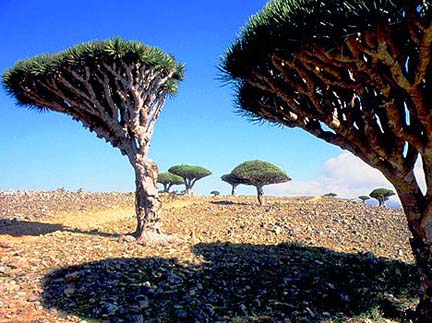
The famous dragons blood tree; Photo by Valerio Pandolfo
Revolution in Socotra: A Perspective from Yemen’s Periphery
by Nathalie Peutz, Middle East Report #263, Summer 2012.
At the beginning of 2012, as Egyptians and Syrians marked the second year of their revolts, protesters also took to the streets of Hadiboh, the tumbledown capital of Yemen’s Socotra archipelago (pop. approx. 50,000). Like demonstrators elsewhere, the Socotrans were calling for both local administrative change and national political reform. While the Socotran protests, occurring since March 2011, were small, they were no less significant than the more spectacular rallies in the epicenters of Arab revolution. Indeed, the spread of revolution to Socotra, the largest and most populated of the archipelago’s four islands, shows the extent to which the events of 2011 have resonated even at the very margins of the Arab world. Moreover, it demonstrates how socially and culturally empowering these events have been for a people who have long been politically subjugated, economically marginalized and, unlike many in mainland Yemen, unarmed.
For if revolution has reached Socotra, as many young enthusiasts in Hadiboh would claim, it is manifest not merely in the biweekly gatherings of male protesters marching through the dusty market to the familiar slogan, “The people want the fall of the regime.†It is evident also in the way that Socotrans have begun to speak openly and forcefully about their preferences for Socotra’s political future. And it was measurable in the islands’ largest cultural event, a five-day festival during which nine Socotran wordsmiths vied for the title of “poet of the year.†Now in its fourth year, the festival, which began on the eve of 2012, featured poem after poem, in the islanders’ native Suqutri tongue, reflecting on the Arab revolts, the turmoil on the mainland and the fate of the archipelago. Where political discontent long found expression in ruminations on a pastoral past, today it is articulated in contending verses on the prospects for Socotran sovereignty.
For the full article, click here to read it on the MERIP website.